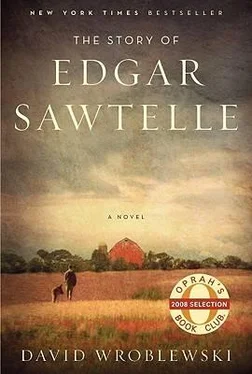They ate like starved kings. They would be gone in a few minutes and never see the place again and he fed them all as much as they could hold. He carried the bratwurst to the back door and tore the paper and spilled the rubbery links across the planks of the stoop. Even before they’d stopped writhing, the dogs were tearing at them. A jar of caramel-colored honey sat on the kitchen table, cloudy with crystallized sugar. Edgar unscrewed the top and ran a finger’s-worth out, then topped a bowl of Wheaties extravagantly with it and splashed milk over the top and stood in the doorway and watched the dogs while he shoveled the concoction into his mouth. The bratwurst was gone almost before he started to eat; the dogs licked their chops and looked at him.
Okay, he signed. Stand back.
He set his cereal down and emptied the water bowl and dumped the contents of a half dozen cans of Campbell’s Chicken Soup into it and several more of creamed corn. When his cereal was gone, their bowl had been licked clean as well. Then he walked onto the stoop with a bag of marshmallows. Three brilliant white cubes sailed through the air. He mashed one into his cheek, grinning evilly, and began another round. Halfway through the marshmallows he was suddenly done. He gestured the dogs back into the kitchen and began to search the kitchen methodically, sorting the food into what he could take and what he should put back. When he finished, he pulled a brown grocery sack from a mass of them behind the refrigerator and stuffed it with their trash. He put the can opener into the silverware drawer and refilled the plastic bowl with water and let the dogs drink. They pushed lethargically to their feet, stomachs belled out. Suddenly he thought it was stupid to have let them eat so much after a long hungry stretch. That risked bloat. But they also risked starving, came the reply. He rinsed the water dish and put it under the cupboard where he’d found it.
There was precious little they could take along. A bag of jellybeans. A flat, frosty package of bacon from the freezer. While he was looking in the freezer he found a package of stew meat, also butcher-wrapped, but too big to carry. He set it in the refrigerator where the brats had been. A jelly jar with pencils and pens and packs of matches stood on the countertop by the door. Out of habit, he grabbed the matches (“The Lute Bar and Grill”) and dropped them into his shirt pocket. Then he searched the small bathroom off the kitchen. The medicine chest contained Bactine (he took it) and iodine and mercurochrome and a scattering of small adhesive bandages in their waxed envelopes (he left them) and gauze, but no Off!
The dogs were milling around the kitchen when he came out. He hustled them out the door and removed his muddy shoes, and then he washed the dishes and rearranged the kitchen and wetted a towel that lay draped over the back of a chair and wiped up the dirt they’d tracked in. When he finished, the kitchen looked reasonably like it had before they’d arrived. The kitchen clock read one-fifteen. He carried the paper bag containing the evidence of their crime to the trash can behind the shed, lifting a fly-strewn bag from on top and jamming his beneath.
They retired to the field. He fetched the Zebco and the satchel and walked along the fence line. Halfway up the slope the Lute water tower was visible again. He heard a rumble and noticed for the first time the railroad tracks at the bottom of the bluff beside the field. A freight train appeared from the south. Out on the road, the crossing bars dropped and the bell clanged. They watched a locomotive and fifteen cars roll along. The tracks appeared to pass by Lute on a tangent. That was good luck, he thought. They might try walking the rails.
But not just then. A postprandial lethargy had taken hold of Edgar and he stumbled to where the dogs lay stretched out in the shade of the lone tree overhanging the fence. Tinder lay on his back, feet raised in a posture of surrender. Baboo and Essay faced the fence, chins on paws, gazes dreamily fixed on the horizon. As Edgar reached them, Essay heaved a roaring burp, licked her lips, and rolled onto her side. Edgar felt just the same. The sunflowers hid them nicely from the house. He sat down beside Baboo and stroked his ruff until the dog’s eyes drooped shut. Then Edgar lay back on the grass.
WHEN HE WOKE, enormous cuneiform clouds had rolled across the sky, and between them great slant columns of afternoon sunlight tilted onto the earth. He yawned and sat up. He looked around. Though evening was well along, an hour or two of good light remained, he guessed. If they started at once and the traveling went easily, they might make several miles’ progress before bedding down again. His head throbbed from sleep or feast or both. The dogs, too, seemed dazed. They stood and yawned and shook themselves out and somehow slid down to the ground again. He let them lie and snuck downfield for another look at the house.
Someone had recently arrived. A plain-looking sedan sat parked next to the stoop and the trunk was hinged open and a tall, lean man, maybe thirty years old, was hefting grocery bags out of its depths. The man had already been inside the house, for the back door stood open, but he seemed unalarmed. Edgar smiled to himself. He’d begun to take pride in his skill as a burglar. He had turned it into a kind of game-how much could he take before they noticed? How could he rearrange things to hide what was missing? People didn’t expect someone to break into their houses to steal a little food; they expected to be ransacked-to lose televisions, money, cars, to find their dresser drawers dumped, their mattresses overturned. No one in the cabins (as far as he could tell) had ever done more than scratch their heads at their depleted larder. Who stole half a loaf of bread and then cleaned up after himself? Edgar and the dogs had feasted where this man now unpacked his groceries, and there was a chance he wouldn’t even notice.
When he returned, Edgar found the dogs sniffing with great interest the package of bacon he’d taken from the kitchen of the little farmhouse. He looked at them and shook his head in disbelief. Edgar himself felt like one of those snakes that swallowed pigs whole; he didn’t actually slosh as he walked but the idea of putting more food inside his belly was laughable. He shooed them away and they pranced backward and watched him while he stuffed their loot into the satchel. Then he grabbed the Zebco and led the dogs down the bluff.
The railroad tracks veered to the northwest. A person could judge whether a train was coming, he’d read, by pressing an ear to one of the rails, and he tried it: the scored silver bar was warm but silent. The four of them trotted up the track far enough that a passing motorist wouldn’t make much of them-a boy and some dogs-and then, as the night came on, he ambled along, tie to tie, feeling content and even swaggering a bit at the thought of their success raiding the farm. Scrub wood paralleled the tracks left and right. Far ahead, a low uncovered bridge waited in the gloaming. Stories came back to him of people struck by trains as they walked the rails, and he wondered how that was possible-wouldn’t anyone hear a train thundering toward him long before it arrived? He hoped one would come by just so he could count off the seconds between the first sound of it and when it passed.
These were his thoughts when Tinder first cried out, a yike of surprise and pain that made Edgar’s stomach instantly knot in fear. He knew where each of the dogs was-Essay and Baboo had been poking along beside him on the ties, as content and lost in thought as he, but Tinder had trotted down the grade to investigate something in a stand of cattails. Probably frogs, Edgar had thought. He even recalled seeing, from the corner of his eye, Tinder stiffen and pounce. But his attention had been directed up the tracks, imagining onrushing trains. Tinder’s motion had looked unexceptional-the dogs pounced dozens of times each day, on toads, frogs, field mice, grasshoppers, who knew what.
Читать дальше
Конец ознакомительного отрывка
Купить книгу












